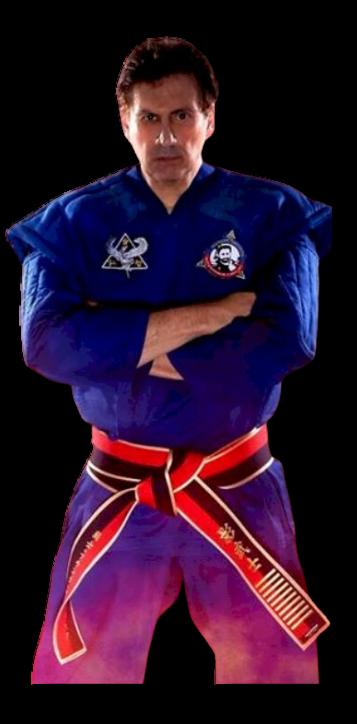
11 minute read
FACTS VS. LIES
The Legend of BLOODSPORT

Written by Allen Woodman
Love him or hate him, one of the most relevant names in the history of traditional Asian and modern era martial arts is Bloodsport’s, Frank W. Dux.
At first glance the meme: “FACEBOOK TOOK DOWN A CHUCK NORRIS POST SO CHUCK NORRIS TOOK DOWN FACEBOOK. THEN FRANK DUX MADE CHUCK PUT IT BACK UP,”. It seems all in good fun.
In the world of martial arts, there are two distinct realms: the intense and violent military world, and the more ethereal and entertaining world. Frank Dux is a name that is considered iconic in both of these realms.
This duality is why he has the most impactful name in martial arts history.
In the bustling nexus where facts versus fantasy collide with the fighting spirit, a name echoes through the halls of martial arts history—Frank William Dux.
Like a whispered legend, Dux’s legacy entwines the traditional art forms of ancient Asia with the dazzling neon glow of modern action cinema.
At first glance the meme: “FACEBOOK TOOK DOWN A CHUCK NORRIS POST SO CHUCK NORRIS TOOK DOWN FACEBOOK. THEN FRANK DUX MADE CHUCK PUT IT BACK UP,”. It seems all in good fun.
In the world of martial arts, there are two distinct realms: the intense and violent military world, and the more ethereal and entertaining world. Frank Dux is a name that is considered iconic in both of these realms.
Frank Dux stands as a polarizing figure, a catalyst in the evolution of combat sports.
Enter the arena of Bloodsport, the 1988 cult classic that catapulted the notion of mixed martial arts into the global consciousness. At its heart, the enigmatic Frank Dux both inspired the story and orchestrated its ballet of violence. Against the backdrop of a skeptical Hollywood, skeptical that action films had run their course, Bloodsport soared, defying all odds with a gripping narrative and kinetic choreography courtesy of Dux himself.
With a shoestring budget that would barely cover a Hollywood starlet’s wardrobe, Bloodsport raked in a king’s ransom, turning a tidy $1.5 million investment into a staggering $100 million, a box office and syndication triumph.
Its secret? Authenticity and fight sequences were so compelling they left audiences spellbound.Frank Dux didn’t just train Jean-Claude Van Damme; he transformed him into an icon of strength and skill. Region by region, Bloodsport seized the number one spot, reinvigorating a genre on the brink of extinction.
And yet, not all is clear in the legacy of Frank Dux. Shadows of doubt loom large as heated debates of fraudulence and claims of literary theft bubble to the surface stemming from the trade libeling of him by his corporate rivals, unable to compete with his accomplishments or claim them for themselves.
Among the voices is one of Bloodsport’s three WGA-credited screenwriters, Sheldon Lettich, who contends the verbiage “Story by Sheldon Lettich.” appearing in the end credit roll for Bloodsport proves this is his brainchild when to the contrary, the Written Agreement memorializes Bloodsport is NOT a creative work by Sheldon Lettich.
The reason Sheldon Lettich has his Bloodsport “Story By” credit is he negotiated this away from Frank Dux, having brought the funding source producer Mark DiSalle to his then-screenwriting partner Dux, first to take Bloodsport story to a concrete form; work titled Return of the Ninja. He registered before having ever met Lettich.
This truth is reflected in how, in place of what would have been the customary story option/purchase agreement one enters into selling a script, Sheldon Lettich entered into a Writing Services Agreement with DiSalle, where Lettich acknowledges the producers BOUGHT THE STORY (from Dux) and that Lettich was really a -- “Work For Hire.” The fact that the Frank Dux Agreement is a purchase option Agreement that memorializes he retains all literary rights in which Sheldon has no equity proves outright that Bloodsport is the brainchild of Frank Dux.
More significantly, all the written agreements establish that Bloodsport could not be made fiction. Doing so resulted in a breach of contract litigation. Frank Dux vs. FM Entertainment. Canon Films and Mark DiSalle, who transferred their ownership interests to FM, did not own fictionalization rights. Furthermore, this is reflected in addendums made to Frank Dux Bloodsport Agreement that were necessary to allow for the fictionalization of certain parts in the film (i.e., Dux going AWOL to fight to honor his master).
In defaming Frank Dux, Sheldon Lettich and others claim that Frank Dux’s Kumite claims have no basis in fact that he bought his trophy; there exists no proof to be found regarding his teacher Senzo Tanaka, The Black Dragons, and his Titles World Records. This doesn’t exist.
In stark contrast, YouTube footage shows Frank Dux being presented by government sport regulating authorities his world titles and records in front of thousands: a free ancestory.com search proves Senzo Tanaka's existence.
Likewise, The Black Dragon Society, Kumite fighting events are equally well documented in history books and criminal prosecutions.
Overlooking how his failure to provide a based on actual event screenplay put Sheldon Lettich in breach of his Bloodsport agreement, and no breach was filed. In addition, Lettich registered his screenplay with the WGA as “Based on A True Story.” A contradictory statement of fact made by him.
Taking credit for Frank Dux's intellectual property contributions didn’t stop with Bloodsport for Lettich with the WGA intervening and awarding, in 1998, Frank Dux deserved “Story By” credit for Universal Studio film, “The Quest”.

Lettichs' name on the shooting script is credited as having provided the material for it when it was Frank Dux, and this was his story.
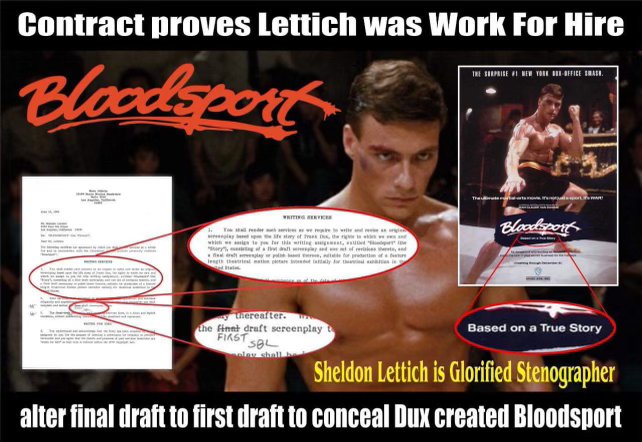
With regard to the genesis of Bloodsport, Dux penned his original Bloodsport script in 1980, five years before Lettich's involvement. Dux registered it with Writers Guild America West under the then working title Return of The Ninja.
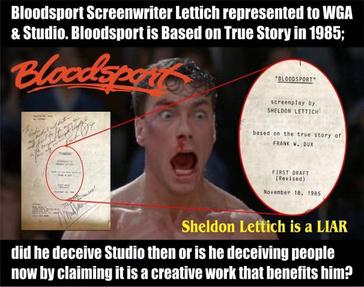
The Bloodsport title is the result of Canon films selling at the AFM in 1981, Enter the Ninja, and its original producers requesting the name change to avoid confusion or legal entanglements.
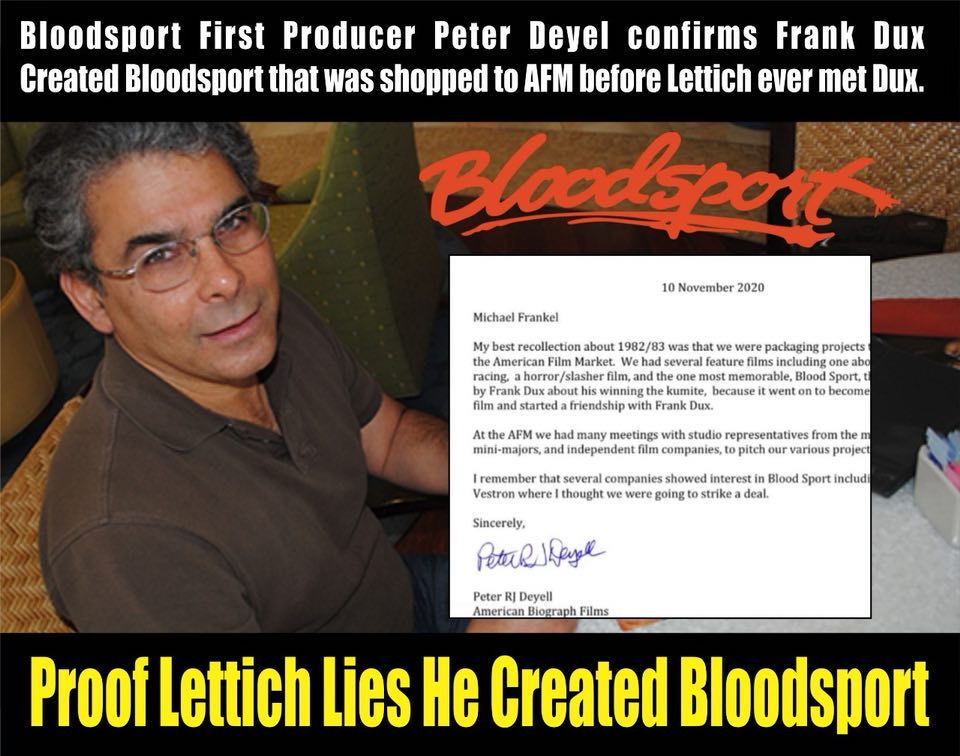
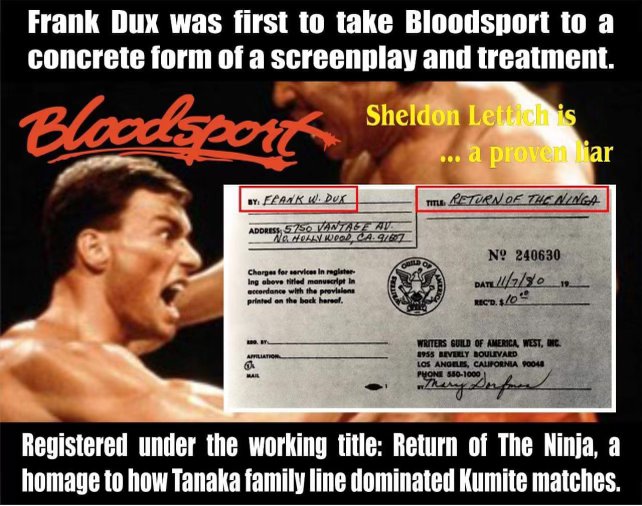
Further contradicting Sheldon Lettich, more hard evidence and corroborations abound, underscoring the veracity of Dux’s story -- articles, a documentary, legal testimonies, and irrefutable courtroom witnesses, like former Warner Bros. VP of Marketing and Publicity Joe Sinda.
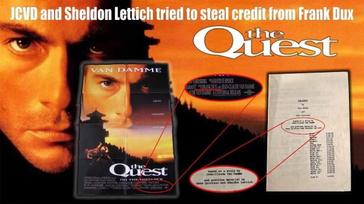
In various on-camera interviews, the former Warner Bros. executive describes Frank Dux hang time as having rivaled Michael Jordan. That Sinda, amongst others like Big Jim McCune, David German, and more, was on hand to witness Dux win the Kumite depicted by Bloodsport and verified by the leading martial art magazine staff in November 1980, Black Belt magazine. Sinda, having borne firsthand account of Dux’s Kumite triumphs, paved the way for Warner Bros Distribution of Bloodsport.
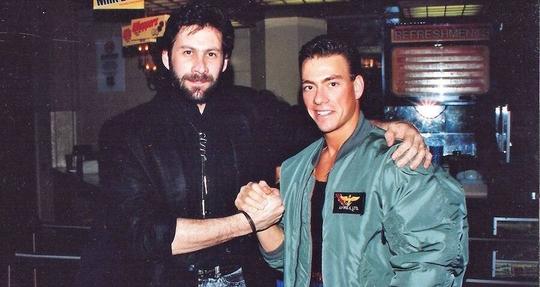
DID YOU KNOW?
Frank W. Dux personally trained JCVD for his role in the film. Frank was also responsible for choreographing all the action scenes and fights for the movie.
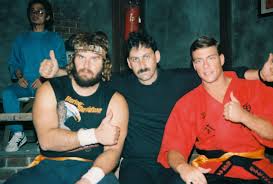
DID YOU KNOW?
The movie “Bloodsport” which launched Jean Claude Van Dams movie career was based on the real-life events of Frank W. Dux
DID YOU KNOW?
Dux set world records at a packed Bercy Sports Stadium in Paris France. Breaking two champaign bottles with a single kick and a palm strike through tested Bullet-proof Glass.
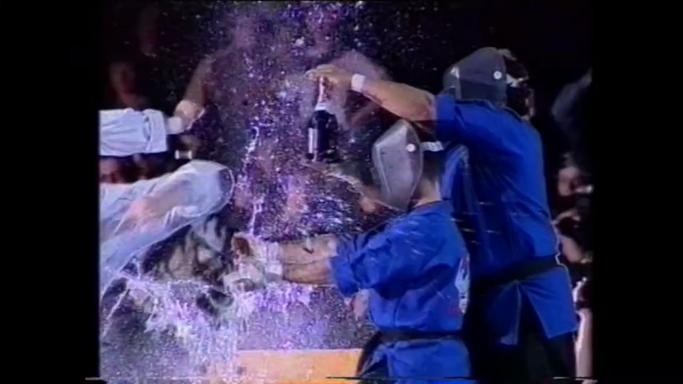
DID YOU KNOW?
Frank Dux is listed as a contributing source in creating the U.S. Navy SEAL Special Warfare Combat Fighting course Manual


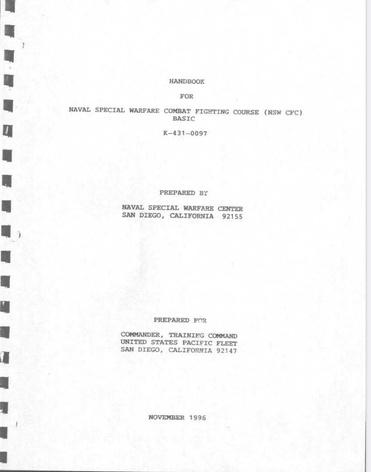
With millions for Canon Films as well as professional reputations at stake, a person must suspend logic, industry custom, and practice of performance of legal, due diligence to accept “Everyone just took Dux word for it,” professed by Lettich and martial art luminaries. That benefit in creating the illusion Bloodsport is a creative work in their pigeonholing of Frank Dux. His not succumbing to this foul play is further testimony to his legend.
As unbelievable as it may seem, Dux's script satisfied the stringent criteria and critical eye of legal due diligence for truth in advertising, aligning perfectly with the movie’s marketing narrative. Beyond the silver screen, Dux’s influence permeates the very fabric of mixed martial arts. But to credit him solely for the creation of MMA would be to overlook the rich tapestry of fighting disciplines that the sport encompasses.
Nevertheless, Dux’s contributions to popularizing martial arts cannot be overstated—with Bloodsport as the catalyst, a combat revolution was televised. In the wake of this cinematic giant, numerous films followed suit, drawing from the blueprint of Bloodsport to capture the imagination of future warriors. But beyond the lights and cameras, Frank Dux’s odyssey extended to the settings of world records and martial arts festivities, sometimes facing off against the very fighters he sought to recruit for his own fighting league. This is the saga of Frank Dux—a man shrouded in myth, enshrined in celluloid, and forever ingrained in the annals of martial arts history.
As we turn the page on this chapter, one cannot help but ponder will the real Frank Dux, please stand up. Or perhaps, in the dance of light and shadow, the intrigue is the essence of his enduring allure.
DID YOU KNOW?
Frank Dux holds his trophy as from the infamous “Kumite.”
In an attempt to debunk him, an editorial appeared with a hand drawn receipt in the L.A. Times stating that Frank bought his trophy. Notice that the bogus receipt has the name misspelled poorly, and the hand-drawn diagram does not even resemble the trophy won.
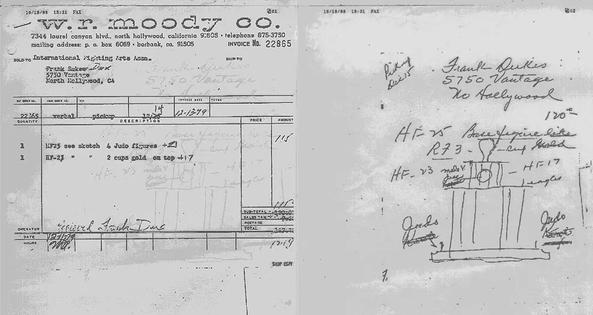
The original photo of Frank Dux was published in Black Belt Magazine, 8 years prior to the receipt and long before the editorial was ever published.
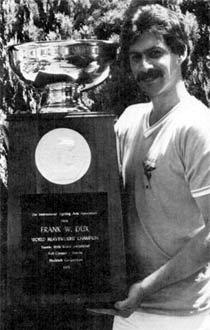
Dux’s odyssey, chronicled in the pounding beats and shattered glass of "Bloodsport," transcends the glitzy veneer of Tinseltown. This martial arts maestro didn’t just break box office records; he shattered real-world ones—raising the stakes, the spectacle, and the spirits of martial artists everywhere.
As we recount the adrenaline-packed exploits that saw Dux crack champagne bottles with the finesse of a seasoned sommelier and power through bullet-proof glass with his bare hands, we’re not just revisiting record-breaking moments. We're diving into an era defined by a man whose life story could rival the most spellbinding of scripts.
Far from the heights of a Hollywood legend, Frank has been actively training in martial arts, opening several martial arts schools as well as training elite tactical teams. Frank Dux has been the keynote speaker for FLEOA (Federal Law Enforsment Officers association) an unprescidented 2X.
Frank W. Dux is listed as a contributing source in the Special forces SEAL team Spec Warfare Manual and has actively trained several law enforcemnt entities throughout his career.
Frank Dux didn't just usher in a new dawn for martial arts—he escorted it into the limelight with the poise of a heavyweight champion, leaving an indelible mark on the world of martial arts.

The Gracies may claim dominance, and new champions may rise, but it's the crescendo of Dux's blood-pumping legacy that beats at the heart of combat sports.
As "Bloodsport" burned its images into the retinas of martial arts enthusiasts, it fueled a fire that led to the birth of the Ultimate Fighting Championship. With every punch thrown in the octagon, echoes of Dux's own strikes can be felt.
But the Frank Dux narrative isn't just about fists and feet—it's a saga that stretches into the very soul of martial arts. It is a story not only of a man who achieved unparalleled triumphs but of one who dared to dream of his own fighting league, only to be pigeonholed by the very individuals he wished to elevate.
From the electrifying atmosphere of Paris' Bercy Stadium to the star-studded gatherings in Beverly Hills, Frank Dux moved with the gravitas of a martial arts luminary—his name synonymous with both grandeur and controversy, his legacy a pageant of achievements and unsolved riddles.
Frank Dux remains an enigma—a figure shrouded in legend, his shadow cast long over the MMA world. His journey, a blend of ferocity and finesse, a spectacle of power and resilience, continues to inspire, astonish, and provoke the minds of those who follow in his swift, storied footsteps.
As the curtain falls on the Frank Dux chronicle, one question lingers in the air like the remnant echo of a knockout blow: what is the true measure of a legend, if not the stories that survive the test of time and the roar of the crowd?
For more info visit www.frankduxbloodsport.com
